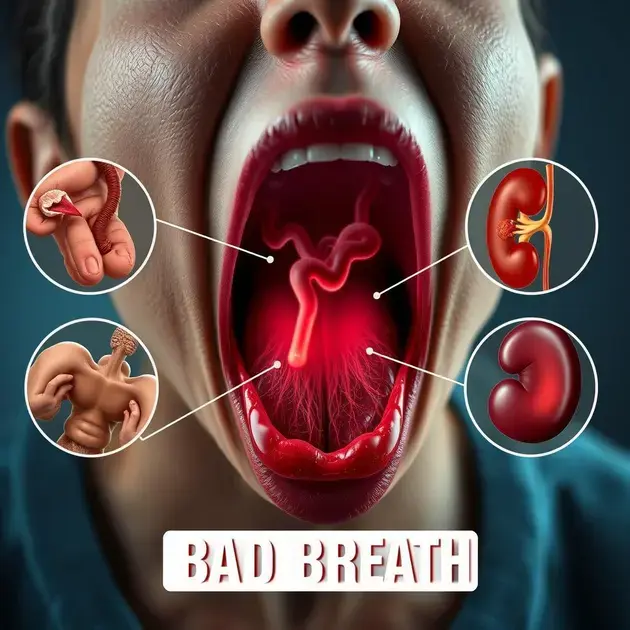Bad breath, or halitosis, often arises from poor dental hygiene. However, it can also be a sign of underlying health issues. Common diseases that lead to bad breath include respiratory tract infections, chronic sinusitis, and digestive disorders. Addressing these health conditions can often improve breath and enhance overall well-being.
Recent studies indicate that disorders such as diabetes and kidney disease can also contribute to the occurrence of bad breath by altering body metabolites and causing distinct breath odors. This highlights the importance of comprehensive health checks when persistent bad breath is experienced, ensuring both dental and general health factors are examined.

Respiratory Tract Infections: A Common Culprit for Bad Breath
Respiratory tract infections such as bronchitis and pneumonia can often lead to bad breath. The infections in the respiratory tract can cause inflammation and the production of mucus, which can serve as a breeding ground for bacteria. These bacteria can release volatile sulfur compounds, leading to the characteristic foul odor associated with bad breath.
To address respiratory tract infections causing bad breath, it is crucial to first treat the underlying infection. Antibiotics prescribed by a healthcare professional can help clear the infection and reduce the bacterial activity in the respiratory tract. Additionally, staying hydrated and using saline nasal sprays can help to clear out mucus and reduce bacterial growth.
An effective way to prevent respiratory tract infections and consequent bad breath is by practicing good hygiene. Washing hands frequently, avoiding close contact with individuals who are sick, and getting vaccinated against flu and pneumonia can help reduce the risk of respiratory infections.
One useful app for tracking respiratory infections and receiving information on prevention is the CDC app, provided by the Centers for Disease Control and Prevention. This app offers real-time updates on respiratory illnesses circulating in your area and provides tips on staying healthy.
By staying informed, practicing good hygiene, and seeking timely treatment for respiratory infections, individuals can effectively combat the common culprit of bad breath associated with these conditions.
Chronic Sinusitis: The Silent Cause of Halitosis
Chronic sinusitis, a condition characterized by inflammation of the sinuses lasting for 12 weeks or more, can often be a silent cause of halitosis or bad breath. The excess mucus produced in the sinuses due to inflammation can drip down the back of the throat, leading to the growth of bacteria and the production of foul-smelling compounds.
To address chronic sinusitis causing halitosis, individuals can consider using saline nasal irrigation to flush out excess mucus and reduce bacterial colonization in the sinuses. In cases where antibiotics are necessary to treat the infection, a healthcare provider can prescribe the appropriate medication.
Regularly using a humidifier in the bedroom can help keep the sinuses moist and prevent the mucus from drying out and becoming a breeding ground for bacteria. Avoiding known triggers of sinus inflammation, such as allergens and pollutants, can also help in managing chronic sinusitis.
An informative website for individuals looking to learn more about chronic sinusitis and its association with bad breath is WebMD. This website offers articles written by medical professionals, as well as tools for finding healthcare providers specializing in sinus conditions.
By taking steps to manage chronic sinusitis effectively, individuals can address the silent but significant cause of halitosis and improve their overall quality of life.
Diabetes and Kidney Disease: Surprising Factors in Bad Breath
Diabetes and kidney disease are two surprising factors that can contribute to bad breath. In diabetes, high blood sugar levels can lead to ketoacidosis, a condition characterized by the production of ketones that can cause a fruity odor on the breath. Similarly, individuals with kidney disease may experience an accumulation of waste products in the body, leading to ammonia-smelling breath.
To address bad breath associated with diabetes and kidney disease, it is crucial for individuals to maintain optimal control of their blood sugar levels and seek regular medical monitoring for kidney function. Following a healthy diet, staying hydrated, and taking medications as prescribed can help manage these conditions and reduce the impact on breath odor.
In addition to medical management, individuals can consider using sugar-free gum or mints to mask temporary bad breath. These products can help stimulate saliva production, which can aid in washing away bacteria and reducing odor in the mouth.
For comprehensive information on managing diabetes and kidney disease and their potential effects on bad breath, individuals can explore the American Diabetes Association (ADA) website. The ADA offers resources, guidelines, and support for individuals living with diabetes to optimize their health and well-being.
By addressing the underlying factors of diabetes and kidney disease, individuals can effectively manage bad breath and improve their overall health outcomes.

Poor Oral Hygiene: A Major Contributor to Bad Breath
Poor oral hygiene is one of the leading causes of bad breath, also known as halitosis. When we neglect our oral health by not brushing and flossing regularly, food particles can remain in our mouth and promote bacterial growth. This bacteria release sulfur compounds that result in an unpleasant odor. In addition, plaque buildup can lead to gum disease, another common source of bad breath.
To combat bad breath caused by poor oral hygiene, it is essential to establish a regular dental care routine. This includes brushing your teeth at least twice a day, flossing daily, and using mouthwash to kill bacteria. Regular visits to the dentist for professional cleanings and check-ups are also crucial in maintaining good oral health.
Furthermore, staying hydrated by drinking plenty of water can help wash away food particles and bacteria in the mouth. Chewing sugar-free gum or eating crunchy fruits and vegetables can also stimulate saliva production, which aids in keeping the mouth clean and fresh.
Improving your oral hygiene habits not only helps prevent bad breath but also contributes to overall health and well-being. By taking proactive steps to care for your teeth and gums, you can enjoy the benefits of a clean and fresh breath.
Digestive Disorders: A Hidden Cause of Halitosis
While poor oral hygiene is a common cause of bad breath, digestive disorders can also play a significant role in halitosis. Conditions such as gastroesophageal reflux disease (GERD), ulcers, and gastritis can result in foul-smelling breath due to the presence of stomach acids in the esophagus and mouth.
Individuals suffering from digestive disorders may experience chronic bad breath that persists even after practicing good oral hygiene. In such cases, treating the underlying digestive issue is crucial to effectively combat halitosis. Consulting a healthcare professional for proper diagnosis and treatment is essential in addressing the root cause of bad breath.
In addition to medical intervention, following a healthy diet and lifestyle can help manage digestive disorders and reduce their impact on bad breath. Avoiding trigger foods, such as spicy and acidic items, and maintaining a balanced diet can promote digestive health and minimize the occurrence of halitosis.
By addressing digestive disorders and adopting healthy habits, individuals can improve their overall well-being and enjoy fresh breath. Understanding the connection between digestive health and bad breath is key to effectively managing halitosis.
Medication Side Effects: Unforeseen Factors in Bad Breath
Medications play a vital role in managing various health conditions, but their side effects can sometimes contribute to bad breath. Certain medications, such as antihistamines, antidepressants, and chemotherapy drugs, can cause dry mouth as a side effect. A dry mouth lacks sufficient saliva to cleanse the mouth effectively, leading to an increase in bacteria and odor production.
Individuals taking medications that produce dry mouth may experience persistent bad breath despite practicing good oral hygiene. To alleviate this issue, staying hydrated by drinking water regularly and using saliva-stimulating products can help combat dry mouth and reduce bad breath. Consulting a healthcare provider for alternative medication options or additional treatments may also be beneficial.
In some cases, medication side effects are unavoidable, but proactive measures can be taken to minimize their impact on oral health. Maintaining a meticulous oral hygiene routine, including brushing, flossing, and rinsing with mouthwash, is essential in managing bad breath associated with medication use.
By staying informed about the potential side effects of medications and taking proactive steps to mitigate them, individuals can better manage bad breath while addressing their health needs. Collaborating with healthcare professionals to find solutions that balance medication efficacy with oral health is crucial in achieving fresh breath and overall well-being.
Conclusion
It is evident from the discussion that poor oral hygiene is a significant factor contributing to bad breath, or halitosis. Neglecting regular oral care can lead to the accumulation of food particles and bacterial growth, resulting in unpleasant odors. Establishing a consistent dental routine involving brushing, flossing, and mouthwash usage, along with regular dental check-ups, is crucial for maintaining good oral health and combating bad breath.
Furthermore, digestive disorders such as GERD, ulcers, and gastritis can also play a role in causing halitosis. Individuals with these conditions may experience chronic bad breath even with proper oral hygiene practices. Managing the underlying digestive issues through medical intervention, along with a balanced diet, can help reduce the impact of these disorders on bad breath and overall well-being.
Additionally, medication side effects, particularly dry mouth caused by certain drugs, can contribute to persistent bad breath. To address this, staying hydrated, using saliva-stimulating products, and maintaining excellent oral hygiene are essential. Collaboration with healthcare professionals to explore alternative medication options can further aid in managing bad breath associated with medication use.
